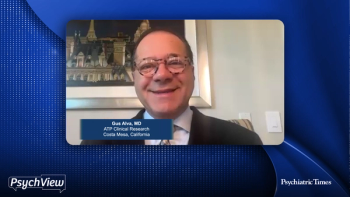
Closing Thoughts on DTx and PDTs
Our panel concludes with their final thoughts on using DTx and PDT management.
Episodes in this series

John Fox, MD: This has been a rich and wide-ranging conversation. Thank you very much for your time. Why don’t we take the last several minutes and give people a chance to summarize? Give us your elevator pitch for why these are a benefit and why we should improve access to them. Does anybody want to start?
Arwen Podesta, MD: I’ll start. PDTs [prescription digital therapeutics] are evidence-based and research-based effective tools to improve outcomes. We have new technology coming down the pipeline every day in general space. Why not use it therapeutically to [improve] health? I want to mention something that we didn’t talk about but hopefully is assumed: the safety is beyond almost any prescription I’ve ever written as a psychiatrist. A lot of my patients come to me not wanting to be on medicines or wanting to move away from medicines that are causing harmful adverse effects, and using these tools is a game changer.
Scott Whittle, MD: I love that. For me, PDTs offer solutions in a number of very challenging spaces. They offer a part of a solution in access. Access to care is incredibly challenging. They offer the engagement element that traditional treatment has struggled to provide. They offer a solution in the space of ensuring that the treatment being provided is evidence based. That isn’t a knock on my colleagues providing talk therapy, but you don’t know what kind of product you’re going to get. But with this, I absolutely know the product I’m going to get.
The other [thing] I love is that it helps me deliver in a space where I have a massive amount of provider exhaustion. I apologize for addressing this late in the discussion, but provider suicide in this space is high. We have a challenge in this. We’re losing providers routinely because of the dissatisfaction of providing care when the tools to be effective and the work that drives them aren’t available. Supplying our providers with something [that helps them] feel like they can be effective is absolutely essential.
Timothy Aungst, PharmD: I agree with all that. To me, health care is changing substantially with different things out there. We can consider hospital to home. We have different diagnostic tools. Digital health is a huge umbrella term. You get into digital medicine, new digital biomarkers of how things are going, and digital therapeutics, which have that high evidence that it can deliver care itself.
If we accept the fact that digitalization [is happening] across all industries, and that health care itself and how we deliver health care is changing substantially, then we have to accept that these things are going to be things consumers want. People are going to want this because they aren’t going to take a step back. They’re going to say, “Why do I have to keep going into an office? Why do I have to keep dealing with these things? Why hasn’t health care adapted like every other industry out there?” That’s going to be the big draw.
I’ll throw it out there for myself. I’m a millennial. I don’t want to operate in a health care system as the baby boomers do. It isn’t my expectation. I’m going to want to do something more nascent, as a digital native. Sometimes I think I’m building the health care for myself for the future, but that’s the reality of the situation. That huge demand of how we expect to access our health, how we deal with it, and the personalization we want for it is going to become very prominent, because we see the same thing everywhere else.
Scott Whittle, MD: Agreed.
John Fox, MD: Thank you, Tim. As a baby boomer, I don’t want the kind of health care that we have, and I’m ready to adopt new technologies. I appreciate your point that everywhere else that we interact with society is digitalized, so why not health care?
Thank you, panelists, for your time, your keen insights, and the dialogue. On behalf of our sponsor, the Managed Healthcare Executive® and Psychiatric Times™ Payer-Provider Perspectives programs, thank you very much to our audience.
Transcript edited for clarity.
Newsletter
Receive trusted psychiatric news, expert analysis, and clinical insights — subscribe today to support your practice and your patients.





